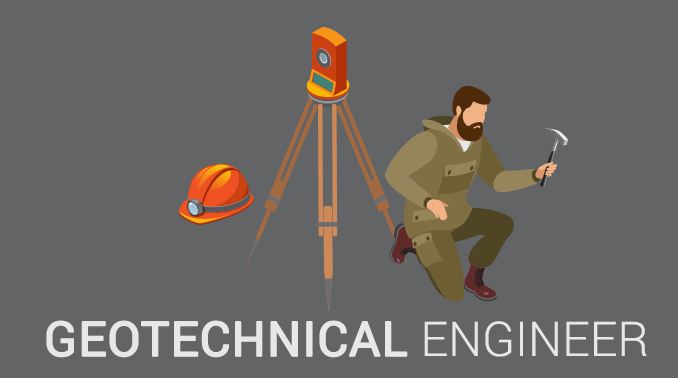Not known Details About Geotheta
Not known Details About Geotheta
Blog Article
A Biased View of Geotheta
Table of ContentsFacts About Geotheta UncoveredGeotheta Can Be Fun For AnyoneThe Single Strategy To Use For GeothetaTop Guidelines Of GeothetaThe smart Trick of Geotheta That Nobody is Talking About

They conduct site examinations, collect examples, do research laboratory examinations, and assess data to assess the viability of the ground for building jobs - Geotechnical Engineers. Based upon their searchings for, geotechnical designers give suggestions for structure layout, slope security, maintaining structures, and mitigation of geotechnical hazards. They collaborate with various other professionals, such as engineers, structural engineers, and building and construction groups, to ensure that geotechnical factors to consider are incorporated right into the overall task layout and execution
By analyzing the actions and residential or commercial properties of dirt and rock, they can recognize possible geotechnical risks such as landslides, soil settlement, or slope instability. Their expertise aids stop failures or crashes that could endanger lives and property. Right here are some comprehensive obligations and responsibilities of a geotechnical engineer: Site Examination: Geotechnical engineers conduct website investigations to gather information on subsurface conditions.
They interpret the information to understand the residential properties and actions of the dirt and rock, including their toughness, leaks in the structure, compaction qualities, and groundwater problems. Geotechnical Evaluation and Design: Geotechnical designers evaluate the data collected during site investigations to evaluate the stability and viability of the site for building jobs. They execute geotechnical calculations and modeling to review variables such as bearing capability, settlement, slope security, side planet stress, and groundwater circulation.
Geotheta - Truths
Structure Design: Geotechnical engineers play an essential function in creating structures that can safely sustain the intended structure. They examine the dirt conditions and lots demands to figure out the suitable structure kind, such as superficial foundations (e.g., grounds), deep foundations (e.g (https://www.openlearning.com/u/ianhammond-shld0k/)., stacks), or specialized techniques like soil improvement. They take into consideration variables such as settlement limits, birthing capacity, and soil-structure communication to create optimum foundation designs
They assess building and construction strategies, screen website activities, and carry out field examinations to confirm that the design referrals are followed. If unpredicted geotechnical problems arise, they evaluate the situation and supply recommendations for removal or adjustments to the layout. Threat Assessment and Reduction: Geotechnical engineers examine geotechnical dangers and risks connected with the project website, such as landslides, liquefaction, or soil disintegration.

Partnership and Communication: Geotechnical engineers function carefully with other professionals associated with a task, such as engineers, structural engineers, and building teams. Effective communication and cooperation are vital to integrate geotechnical considerations into the general project layout and building process. Geotechnical engineers give technological proficiency, response questions, and guarantee that geotechnical requirements are satisfied.
Things about Geotheta
Below are some kinds of geotechnical engineers: Structure Designer: Structure designers focus on designing and examining structures for frameworks. They examine the soil conditions, load requirements, and website features to determine one of the most ideal foundation kind and design, such as shallow structures, deep structures, or specialized methods like heap structures.
They evaluate the factors affecting slope security, such as dirt properties, groundwater problems, and slope geometry, and create techniques to stop incline failings and mitigate threats. Quake Engineer: Quake designers focus on evaluating and designing structures to endure seismic forces. They examine the seismic hazard of a website, assess soil liquefaction capacity, and establish seismic style standards to ensure the safety and security and strength of structures during quakes.
They do field testing, gather samples, and examine the collected information to define the dirt residential properties, geologic developments, and groundwater problems at a website. Geotechnical Instrumentation Designer: Geotechnical instrumentation designers concentrate on monitoring and gauging the behavior of soil, rock, and frameworks. They install and preserve instrumentation systems that check variables such as soil negotiation, groundwater degrees, slope motions, and structural variations to evaluate efficiency and supply early warnings of potential concerns.
The Ultimate Guide To Geotheta
They perform tests such as triaxial examinations, debt consolidation tests, direct shear examinations, and leaks in the structure tests visit this web-site to gather information for geotechnical evaluation and design. Geosynthetics Engineer: Geosynthetics engineers focus on the style and application of geosynthetic products, such as geotextiles, geogrids, and geomembranes. They utilize these materials to improve dirt stability, enhance slopes, provide drainage remedies, and control disintegration.
They have a tendency to be investigatory people, which means they're intellectual, reflective, and analytical. They wonder, systematic, sensible, analytical, and sensible. Several of them are likewise social, meaning they're kind, charitable, participating, patient, caring, helpful, understanding, skillful, and pleasant. Does this sound like you? Take our complimentary profession test to learn if geotechnical designer is one of your leading occupation matches.
In the workplace environment, geotechnical engineers utilize specialized software application devices to execute estimations, develop designs, and analyze information. They prepare reports, testimonial project requirements, interact with clients and staff member, and coordinate task activities. The office setting offers a favorable atmosphere for research, analysis, and cooperation with various other specialists associated with the project.
Some Known Facts About Geotheta.
They frequently see task websites to conduct site examinations, evaluate geotechnical conditions, and gather information for analysis. These brows through entail taking a trip to various locations, occasionally in remote or challenging surfaces. Geotechnical engineers may execute soil tasting, conduct tests, and screen construction tasks to make sure that the geotechnical aspects of the task are being executed correctly.
Geotechnical engineers additionally work in specialized geotechnical research laboratories. In these facilities, they carry out experiments, execute tests on dirt and rock examples, and assess the engineering homes of the materials. Geotechnical lab engineers function thoroughly in these settings, handling testing tools, operating tools, and tape-recording information. They work together with various other lab personnel to make sure precise and dependable testing results.
Report this page